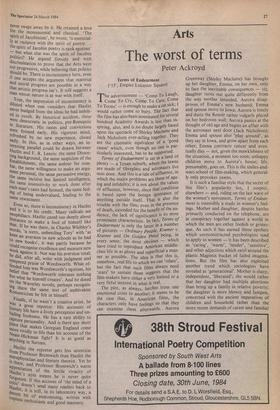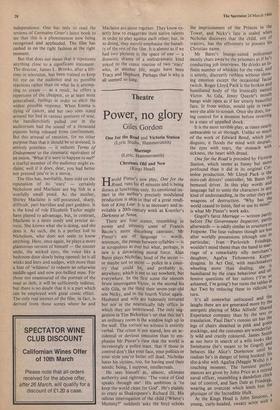Arts
The worst of terms
Peter Ackroyd
The advertisement — 'Come To Laugh, Come To Cry, Come To Care, Come To Terms' — is enough to make a cat sick; I would rather come to bury. The fact that the film has also been nominated for several hundred Academy Awards is less than in- spiring, also, and is no doubt largely based upon the spectacle of Shirley Maclaine and Jack Nicholson over-acting together. They are the cinematic equivalent of a 'good cause' which, even though no one is par- ticularly interested, has to be supported. Terms of Endearment is set in a land of plenty — a Texan suburb, are made of fibreglass andwahsetrreonthaeutisawlinves next door. And this is a tale of affluence, in which the major problems are those of age- ing and infidelity; it is not about the values of affluence, however, since that condition is based upon the benign ignorance of anything outside itself. That is also the trouble with the film: even in the presence of death, extended for the benefit of the au- dience, the lack of significance is its most prominent characteristic. In fact, Terms of Endearment is only the latest in a number of pictures — Ordinary People. Kramer v. Kramer and On Golden Pond being, in every sense, the most obvious — which have tried to reproduce American middle- class life in as glossy and superficial a man- ner as possible. The idea is that this is, somehow, real life to which we can 'relate', but the fact that such films always need 'stars' to sustain them suggests that the film-makers have either a very limited or a very fitful interest in what is real.
The plot, as always, lurches from one emotional crisis to another; it seems to be the case that, in American films, the characters only have feelings so that they can examine them afterwards. Aurora Greenway (Shirley Maclaine) has brought up her daughter, Emma, on her own, only to face the inevitable consequences — viz, daughter turns out quite differently from the way mother intended. Aurora disap- proves of Emma's new husband; Emma and spouse move to Iowa; Aurora is lonely and dusts the Renoir rather vulgarly placed on her bedroom wall; Aurora panics at the thought of old age and begins an affair with the astronaut next door (Jack Nicholson); Emma and spouse also 'play around', as they say in Iowa, and grow apart from each other; Emma contracts cancer and even- tually dies — not, given the mawkishness of the situation, a moment too soon; unhappy children move to Aurora's house; life, presumably, goes on. This is the smiles-and- tears school of film-making, which general- ly only provokes yawns.
It is such a familiar style that the secret of this film's popularity lies, I suspect, elsewhere — and, riding on the last wave of
the women's movement, Terms of Endear- ment is ostensibly a study in women's feel-
ings. Mother and daughter, despite battles primarily conducted on the telephone, are in conspiracy together against a world in which the men are either foolish or grotes- que. As such it has earned those epithets which unreconstructed psychologists tend to apply to women — it has been described as 'caring', 'warm', 'tender', 'sensitive', and other adjectives which swirl around the plastic Magimix bucket of failed imagina- tions. But the film has also exploited another trend which sociologists have revealed as 'generational'. Mother is sharp, independent, 'liberated'; she would rather that her daughter had multiple abortions than bring up a family in relative poverty; the daughter is more blowsy and lumpen, concerned with the ancient imperatives of children and household rather than the more recent demands of career and familial independence. One has only to read the reviews of Germaine Greer's latest book to see that this is a phenomenon now being recognised and applauded. The film has cashed in on the right fashion at the right moment.
But that does not mean that it represents anything close to a significant statement. The director, James L. Brooks, after a life- time in television, has been trained to keep his eye on the audience and its possible reactions rather than on what he is attemp- ting to create — as a result, he offers a repertoire of the cheapest, or at least most generalised, feelings in order to elicit the widest possible response. When Emma is dying of cancer, and her two sons stand around her bed in various postures of woe, the handkerchiefs pulled out in the auditorium had the sound of a thousand pigeons being released from confinement. But this arousal of emotion, for no other purpose than that it should be so aroused, is entirely pointless — it reduces Terms of Endearment to the cinematic equivalent of an onion. 'What if it were to happen to me?' a tearful member of the audience might ex- claim; well if it does, dear, you had better not pretend you're in a movie.
The film has, inevitably, been sold on the reputation of its 'stars' — certainly Nicholson and Maclaine are big fish in a woefully small pond. As the mother, Shirley Maclaine is self-possessed, sharp, difficult, part harridan and part goddess. It is the kind of role Elizabeth Taylor might have played to advantage, but, in contrast, Maclaine is a more steely and precise ac- tress. She knows what she is doing, and she does it. As such, she is a perfect foil to Nicholson, who does not seem to know anything. Here, once again, he plays a more glamorous version of himself — the sinister smile, the wicked eyes, the voice like a bedroom door slowly being opened; he is all winks and leers and nudges, with more than a hint of 'wildness' to redeem an otherwise middle-aged and now pot-bellied man. For those not enamoured of the portrait of the roue as slob, it will be sufficiently tedious, but there is no doubt that it is a part which can be employed with great comic effect. The only real interest of the film, in fact, is derived from those scenes where he and Maclaine are alone together. They know ex- actly how to exaggerate their native talents in order to play against each other; but, in so doing, they merely emphasise the banali- ty of the rest of the film. It is almost as if we had two pictures in the space of one — a domestic drama of a melodramatic kind yoked to the comic routine of two 'stars' who, in another life, might have been Tracy and Hepburn. Perhaps that is why it all seemed so long.











































 Previous page
Previous page